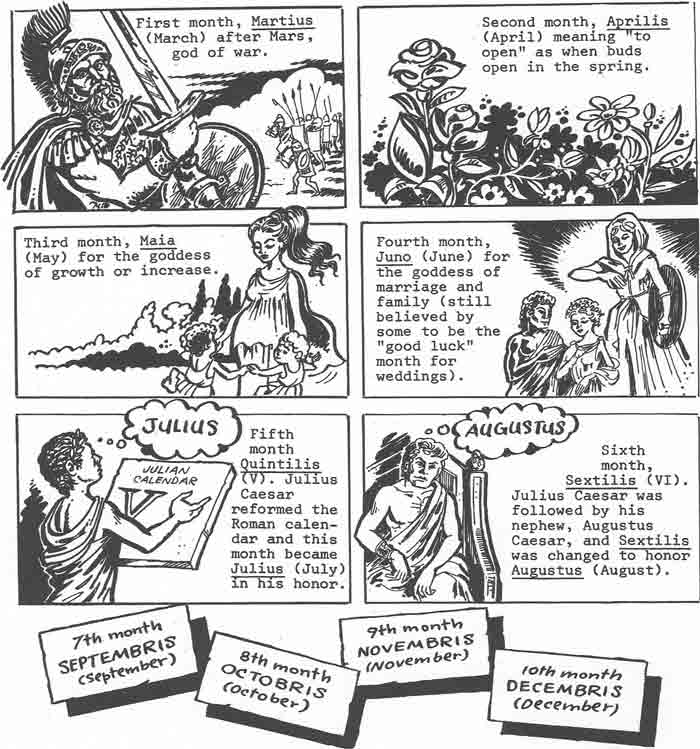Calendar Names of Days and Months in Different Languages
(a compilation of several languages)
The dates displayed in these pages are based on a compilation of the phases of time as expressed in several languages with a presentation of fascinating facts, fantasies, and fallacies that have merged as elements of time.
The equivalents in all of the following languages have been written with Roman/Latin fonts (letters), even in those situations when a language actually employs different letter forms. For example, such languages as Greek, Georgian, Russian (Cyrillic), Hebrew, and Arabic are transliterated into the Roman/Latin-type fonts.
luty (February)
marzec (March)
kwiecien (April)
maj (May)
czerwiec (June)
lipiec (July)
sierpien (August)
wrzesien (September)
pazdziernik (October)
listopad (November)
grudzien (December)
segunda feira (Monday)
terça feira (Tuesday)
quarta feira (Wednesday)
quinta feira (Thursday)
sexta feira (Friday)
sábado (Saturday)
Portugal dropped the five planetary names for the days of the week and replaced them with numerical references because it adopted the regular ecclesiastical (Roman-Catholic) system which was once numerical in an effort to eliminate the use of the names of the "pagan" gods and goddesses.
fevereiro (February)
março (March)
abril (April)
maio (May)
junho (June)
julho (July)
agosto (August)
setembro (September)
outubro (October)
novembro (November)
dezembro (December)

marti (Tuesday)
miercuri (Wednesday)
joi (Thursday)
vineri (Friday)
sîmbata (Saturday)
duminica (Sunday)
februarie (February)
martie (March)
aprilie (April)
mai (May)
iuni (June)
iulie (July)
august (August)
septembrie (September)
octombrie (October)
noiembrie (November)
decembrie (December)
vtórnik(ftórnik)(Tuesday)
sredá(sryedá)(Wednesday)
cetvérg(chitvérk)(Thursday)
pjátnica(pyátnitsa)(Friday)
subbóta(subóta)(Saturday)
voskresén’e(vaskrisyen’ye)(Sunday)
voskresén’e, “resurrection” day. Nedél-ya, "not working" is used in some Russian dialects.
ponedél’nik, po means "after", so "Mon-day" is expressed as the "day after the non-working day".
vtórnik, "second working day after the non-working day".
sredá, "middle" of the week.
cetvérg, "fourth working day after the non-working day".
pjátnica, "fifth working day after the non-working day".
subbóta, "Sabbath" day.
The fact that Tuesday, Thursday, and Friday are spoken of as the second, fourth, and fifth days instead of third, fifth and sixth, shows that the week is thought of as beginning on Monday. This is a natural idea from the point of view of workers.
This interpretation is opposed to ecclesiastical and biblical usage. It is thus in marked contrast with the strong religious feeling expressed in the ordinary Russian name of “Resurrection” day for Sunday.
fevrál’ (f’yevrahl, fivrál’) (February)
mart (mahrt, mart) (March)
aprél’ (ahprail, apryel’) (April)
maj (migh) (May)
ijún’ (eeyoon, iyún’) (June)
ijúl’ (eeyool, iyúl’) (July)
ávgust (ahvgoost) (August)
sentjábr’ (s’yentyahbr) (September)
oktjábr’ (aktyábr’) (October)
nojábr’ (nohyahbr, nayábr’) (November)
dekábr’ (d’yehkahbr, dikábr’) (December)
The Russian language uses what is called a Cyrillic alphabet which was introduced in the ninth century B.C. by St. Cyril, who combined letters from the Greek and Roman alphabets.
lunes (Monday)
martes (Tuesday)
miércoles (Wednesday)
jueves (Thursday)
viernes (Friday)
sábado (Saturday)
febrero (February)
marzo (March)
abril (April)
mayo (May)
junio (June)
julio (July)
agosto (August)
septiembre (September)
octubre (October)
noviembre (November)
diciembre (December)
juma pili, 2nd day (Sunday)
juma tatu, 3rd day (Monday)
juma nne, 4th day (Tuesday)
juma tano, 5th day (Wednesday)
alhamisi, 6th day (Thursday)
ijumaa, 7th day (Friday)
mwezi wa pili, 2nd month (February)
mwezi wa tatu, 3rd month (March)
mwezi wa nne, 4th month (April)
mwezi wa tano, 5th month (May)
mwezi wa sita, 6th month (June)
mwezi wa saba, 7th month (July)
mwezi wa nane, 8th month (August)
mwezi wa tisa, 9th month (September)
mwezi wa kumi, 10th month (October)
mwezi wa kumi na moja, 11th month (November)
mwezi wa kumi na mbili, 12th month (December)
måndag (Monday)
tisdag (Tuesday)
onsdag (Wednesday)
torsdag (Thursday)
fredag (Friday)
lordag (Saturday)
Februari (February)
Mars (March)
April (April)
Maj (May)
Juni (June)
Juli (July)
Augusti (August)
September (September)
Oktober (October)
November (November)
December (December)
wahn ahng-kahn (Tuesday)
wahn hpoot (Wednesday)
wahn hpa-hreu-haht (Thursday)
wahn lsook (Friday)
wahn rsow (Saturday)
wahn ah-htit (Sunday)


